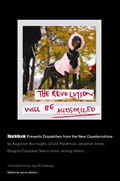The Revolution Will Be Accessorized
 I'm reading a collection of articles from BlackBook, the ten-year-old New York-based glossy progressive culture/fashion magazine. Like Vanity Fair, it often looks like a women's magazine by the cover. But like Vanity Fair, it has great writing and photography intended for an audience of both men and women. And it's smart.
I'm reading a collection of articles from BlackBook, the ten-year-old New York-based glossy progressive culture/fashion magazine. Like Vanity Fair, it often looks like a women's magazine by the cover. But like Vanity Fair, it has great writing and photography intended for an audience of both men and women. And it's smart. I discovered BlackBook when I interned at Utne magazine -- it was one of the thousands of independent publications we all pored over to find interesting articles to reprint. A couple of my favorites appear in the collection The Revolution Will Be Accessorized (The article called "If It Makes You Think, Is It Fashion?" by Glenn O'Brien, in which he asks " Is a Helmut Lang suit of today very different in spirit from Amish wear? ... Is Bill Gates's sweater and jeans the equivalent of the Mao suit, the one look for the masses?" is brilliant.)
In the introduction to the collection, novelist Jay McInerney writes:
"If BlackBook resembles Vanity Fair and Vogue and Rolling Stone in terms of its production values it doesn’t look like, or read like, any of them. The magazine is almost too glossy and too beautiful for its own good and its own progressive and transgressive ambitions—somebody should either shoot the art director or give him a raise. But it’s the kind of magazine that’s alive to its own contradictions and seems to devote some of its pages to exploring them (see the exchange between Douglas Coupland and Naomi Klein, discussing among other things the authenticity of BlackBook and trying to fix its coordinates at the intersection of fashion and advertising.)"And it's that exchange, or the fact that it could happen in BlackBook, that makes this magazine so good.
As liberal as I am, I had always dimsissed Naomi Klein as a smug, holier-than-thou progressive. The kind that I tune out as soon as they utter the words "corporation" or "this administration." I was pleasantly surprised at how reasonable she was. And how shrewd:
"Sadly, I think a lot of this is about self-interest -- confort breeds stasis, Progressives in the United States often try to deal with this by trying to "wake up" the population by hurling alarming facts at them and making them feel guilty about their cars and hamburgers. But my experience is that guilt doesn't last long as a motivator. We need a way of talking about change that questions not just why we are comfortable, when so many people aren't but also whether we are as comfortable as we think we are.I think she's closer to realizing the problems with the Left's methods that most.
"When Arundhati Roy, the novelist, visits the United States, she doesn't try to make Americans feel guilty, she tries to get them to see that maybe their wonderful way of life isn't as wonderful as their politicians keep telling them that it is. For instance, she describes the American dream as 'the right to live alone in your house with your washing machine' and she tells her audiences about what they are missing in countries that have a richer sense of community. Too often we think of 'radicalizing' as getting people to give up their self-interest, instead of helping them to see their self-interest in radically different terms, and to see the pleasures of living differently. [italics mine] The biggest obstacle to 'the future of subversion' is that we no longer understand how change is supposed to happen."


0 Comments:
Post a Comment
<< Home